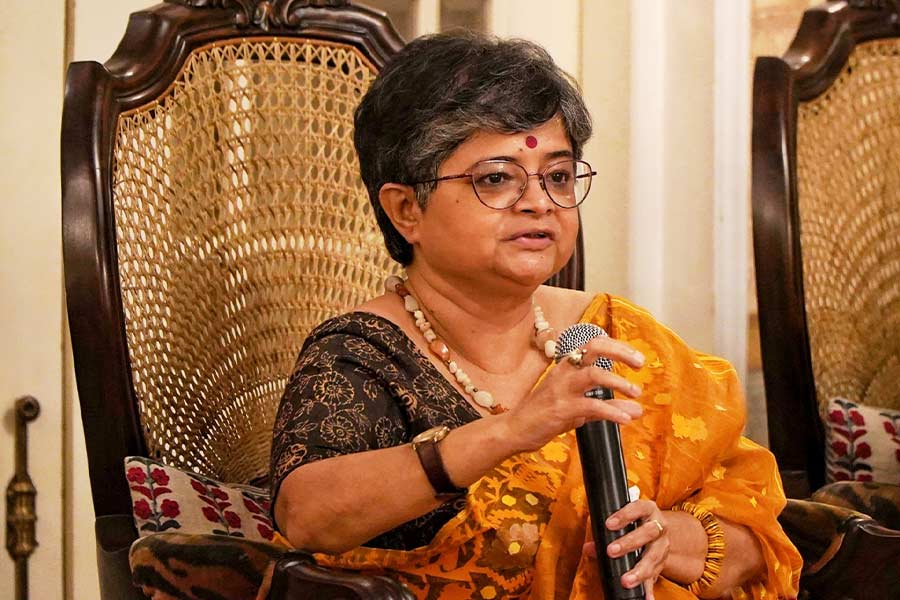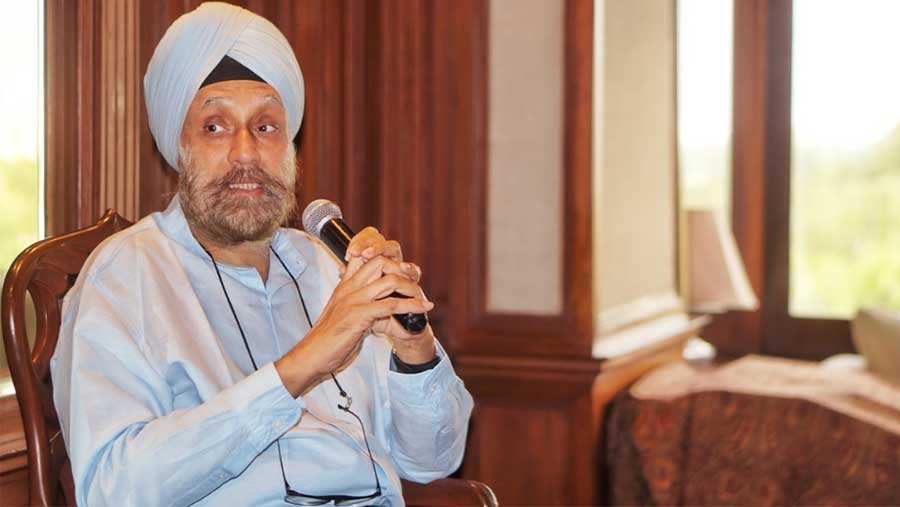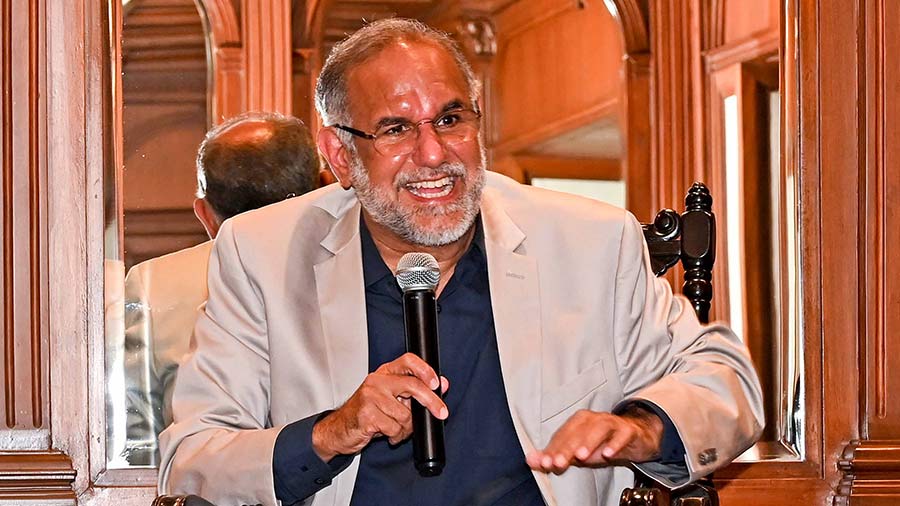On a rain-soaked evening on August 24, literature and history enthusiasts gathered at the Glenburn Penthouse for a stimulating discussion featuring Sarmistha Dutta Gupta, organised by the Glenburn Culture Club, with My Kolkata as digital partner. Dutta Gupta is a writer, researcher and literary translator, working closely with memory and memorialisation, who spoke about her book, The Jallianwala Bagh Journals, which transports readers to the tragic moment of April 13, 1919 that stained India’s history with the blood of martyrs.
Actor-director Ramanjit Kaur set the tone for the event, called “Unforgotten: The Jallianwala Bagh Massacre Revisited”, with her atmospheric reading of ghazals in Punjabi, Urdu and Hindi. Subsequently, Anjum Katyal, director, Apeejay Kolkata Literary Festival, enhanced the multicultural impact of the poems by reciting English translations of the Punjabi and Urdu verses. Penned in the 1920s by survivors and witnesses of the Jallianwala Bagh massacre, the verses throbbed with pain, grief and resentment against the infamous Colonel Reginald Dyer and the draconian Rowlatt Act. With the evocative recitations still ringing in the audience’s ears, Kavita Panjabi, previously a professor of comparative literature at Jadavpur University and the session’s moderator, invited Dutta Gupta to provide a glimpse into the genesis of The Jallianwala Bagh Journals.
‘Small voices of history’ with a focus on women
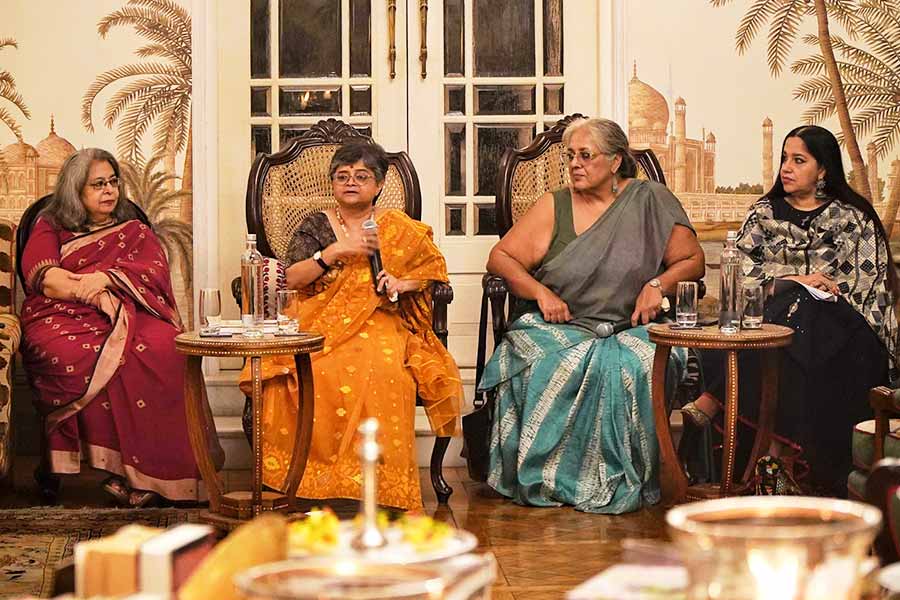
(L-R): Anjum Katyal, Sarmistha Dutta Gupta, Kavita Panjabi and Ramanjit Kaur
“I was deeply inspired by the need to explore the personal and communal memories that have often been overshadowed by grand historical narratives,” Dutta Gupta shared. Her book, she explained, is not merely a retelling of historical facts but an attempt to retrieve and celebrate the “small voices of history”, with a focus on women. This method, Gupta noted, was inspired by her background in women’s and feminist studies, which led her to highlight the often-overlooked stories of women and families who faced the aftermath of the massacre.
Gupta’s approach to history is both intimate and innovative, informed by the stories of revolutionary struggles that she heard from her granduncles who had lived through the country’s most tumultuous years. “The book delves into oral narratives that I collected in 2018-2019 from present-day citizens of Amritsar whose families had lived during those days alongside depositions of women that were recorded by a special inquiry committee 105 years ago. I combined them with personal memoirs, literary responses and, of course, photographs and letters, even music. It is through these diverse sources that I aimed to capture the real essence of what the Jallianwala Bagh massacre meant to individuals and to communities,” described Dutta Gupta.
Panjabi steered the conversation towards Dutta Gupta’s live installation on the Jallianwala Bagh massacre, which was exhibited at the Victoria Memorial Hall in 2019. “A few years into my research, I really wanted to do something where not just historians but the public at large could engage with the history of Jallianwala Bagh,” said Dutta Gupta. While the installation had a short run because of the Covid-19 pandemic’s untimely intrusion, it sparked several questions which gave impetus to the writing of The Jallianwala Bagh Journals.
Panjabi observed that Gupta’s book is a reminder of how our history is crucial to our understanding of the present. “The impact of state terror, oppression and exploitation, the brutal consequences of speaking up — the shadowy stories of these lived experiences evade everyday discussions of history unless they are consciously retrieved by such projects as Dutta Gupta’s,” added Panjabi.
‘Muslims, Hindus and Sikhs were all present at the Bagh’
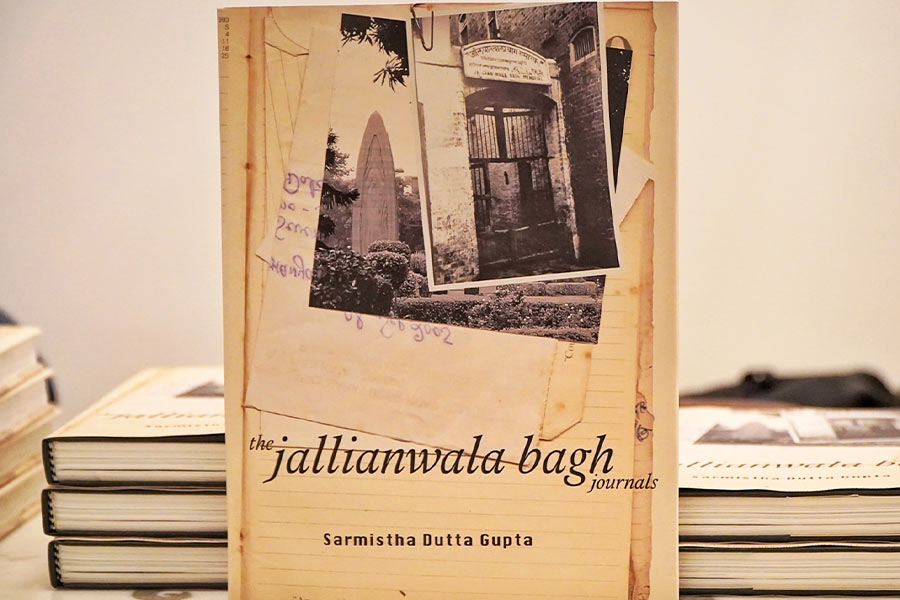
‘The Jallianwala Bagh Journals’ is an example of intimate history
Towards the end of the session, Gupta commented on a vital truth embedded in her work: “There lies a crucial distinction between erecting memorials and sharing memories. While memorials are important, they become meaningless unless we can engage deeply with the nuanced realities of history.” A collective discussion on the fading significance of Jallianwala Bagh ensued as guests agreed that the place, instead of being a space consecrated to mourning, has become a picnic spot for unwitting tourists who flit in and out without attempting to experience the tapestry of its past.
In the lively Q&A session that followed, Anjum Katyal encouraged Dutta Gupta to elaborate on some of the lesser-known aspects of the Jallianwala Bagh Massacre. As part of her response, Dutta Gupta said: “If you just look at the first 20 names on the list of martyrs, you will realise that Muslims, Hindus and Sikhs were all present at the Bagh.” Dutta Gupta also brought to the audience’s attention how Rabindranath Tagore’s engagement with Jallianwala Bagh is usually limited to his refusal of the knighthood when, in fact, he wrote extensively to his friends, poets and writers as well as officials in London for two years after 1919 in an attempt to hold Dyer accountable.
Guests speak
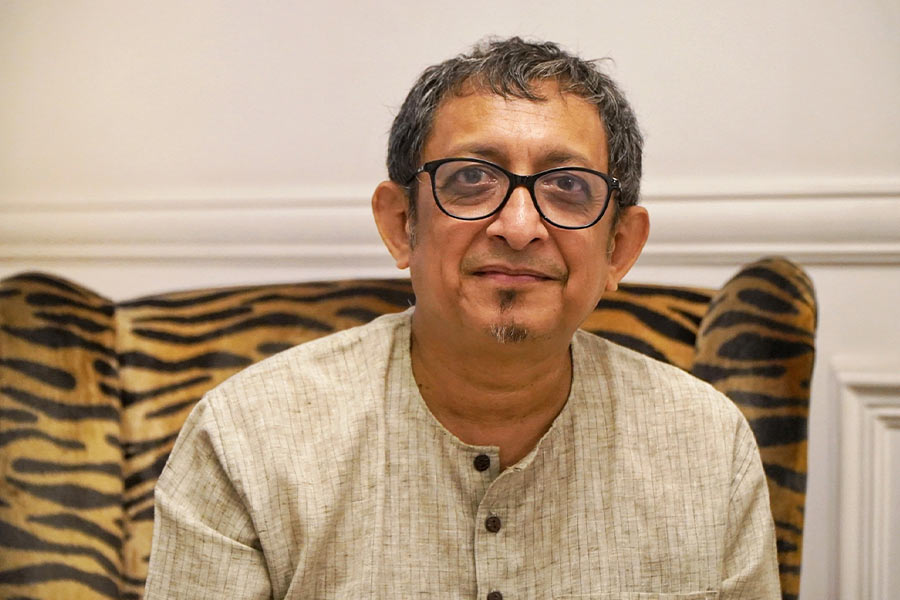
Abhijit Gupta
“This is a remarkable book that not only revisits the hidden histories and tales of the survivors and their families, but also tries to remember the event — not as an official or governmental project, but more in terms of public memory. We (at the Jadavpur University Press) tried to do justice to the book, printing it in colour, printing all the photographs as they deserved to be printed. Sarmistha worked very closely with our designer throughout the project.”
— Abhijit Gupta, professor of English at Jadavpur University and director of Jadavpur University Press
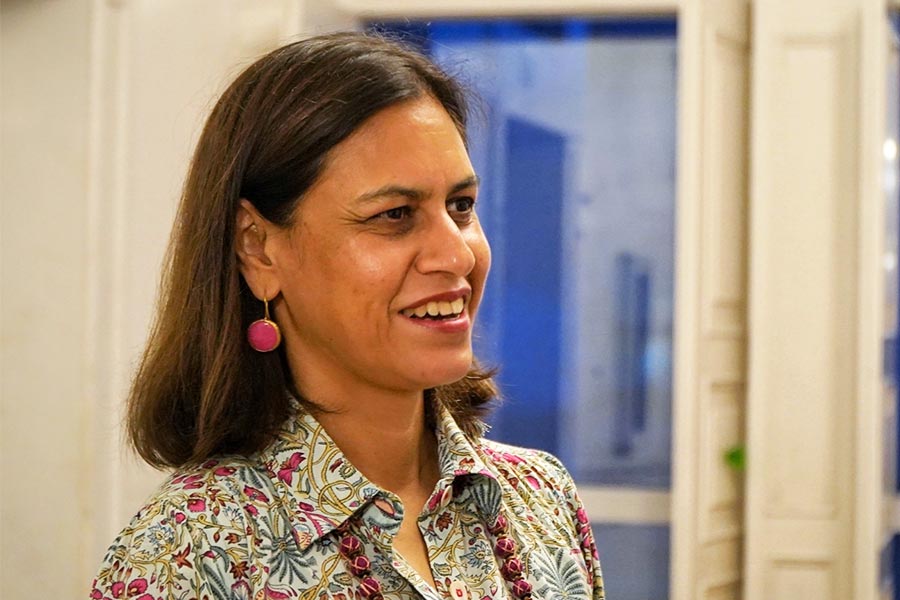
Husna-Tara Prakash
“The Glenburn Culture club is thrilled to have invited Sarmistha Dutta Gupta to talk about this very important event. I love the fact that she focussed on Rabindranath Tagore’s connection with Jallianwala Bagh and the stand he had taken. In today’s times, taking a stand is so important. The Glenburn Culture Club is all about drawing attention to these moments in history and their relevance to current cultural and social situations in the country.”
— Husna-Tara Prakash, owner and managing director at Glenburn
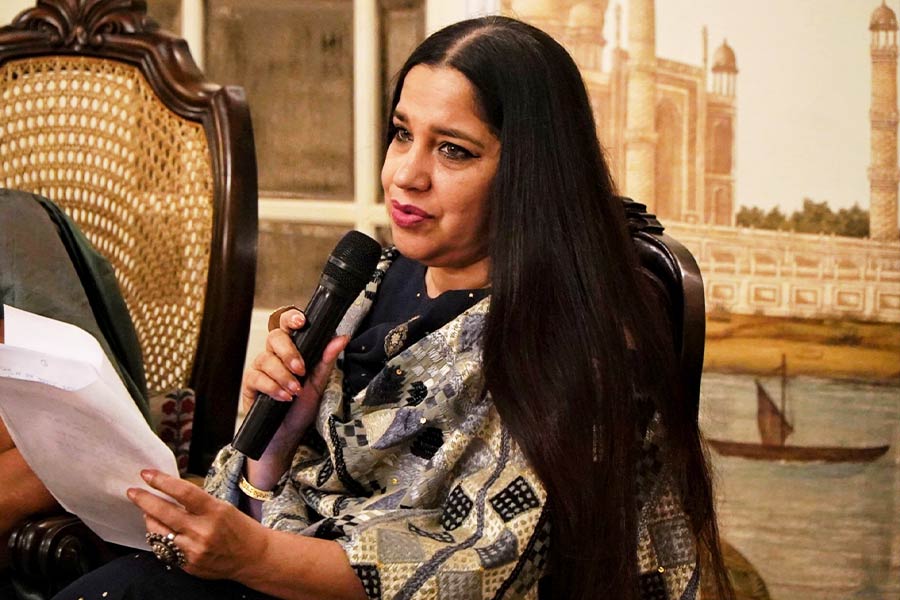
Ramanjit Kaur
“I had also lent my voice to the installation at Victoria Memorial, reading those poems that were about Jallianwala Bagh. Coming from Punjab, it was very close to my heart, so I immediately said yes. Sarmistha Dutta Gupta has done extremely meaningful research, and I’m looking forward to reading the book.”
— Ramanjit Kaur, actor and director
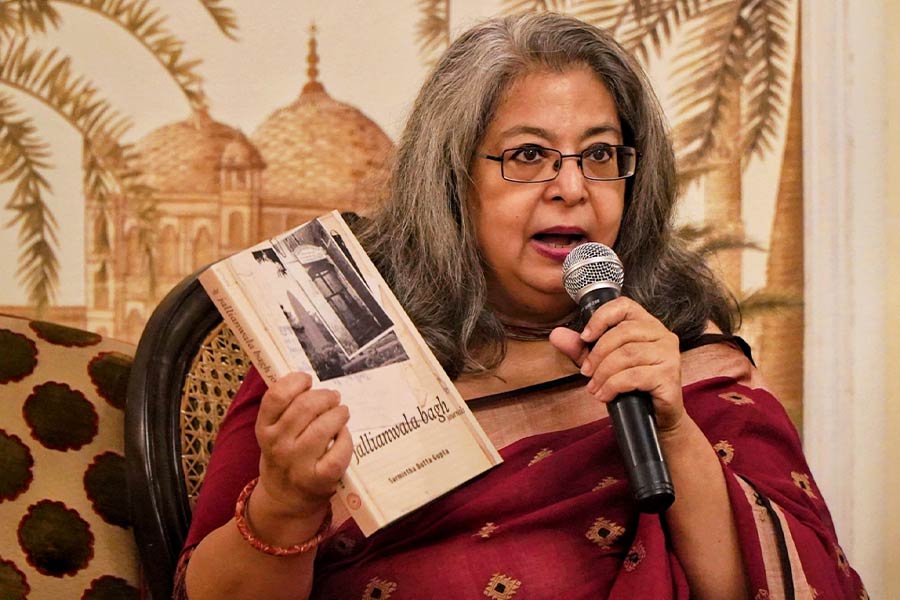
Anjum Katyal
“The evening turned out to be really absorbing, particularly with the multiple languages and the multiple histories available. I could see from the faces of the audience, many of whom come from academia, that they were very interested throughout.”
— Anjum Katyal, director, Apeejay Kolkata Literary Festival
